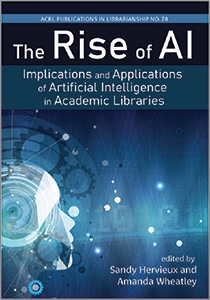
Primary tabs
You don't need to be an ALA Member to purchase from the ALA Store, but you'll be asked to create an online account/profile during checkout to proceed. This Web Account is for both Members and non-Members. Note that your ALA Member discount will be applied at the final step of the checkout process.
If you are Tax-Exempt, please verify that your account is currently set up as exempt before placing your order, as our new fulfillment center will need current documentation. Learn how to verify here.
- Description
- Table of Contents
- About the authors
Librarians are uniquely positioned to rise to the challenge that artificial intelligence (AI) presents to the field. Libraries and their like have existed for millennia; they progress with society, altering and adapting their services to meet the information needs of their communities.
The Rise of AI collects projects, collaborations, and future uses from academic librarians who have begun to embrace AI in their work. In three parts—User Services, Collections and Discovery, and Toward Future Applications—it explores
- machine translation;
- creating incubation spaces;
- robotics;
- combining information literacy initiatives with AI literacy;
- fostering partnerships with other on-campus groups;
- integrating AI technology into collections to enhance discoverability;
- using AI to refine metadata for images, articles, and theses; and
- machine learning.
The Rise of AI introduces implications and applications of artificial intelligence in academic libraries and hopes to provoke conversations and inspire new ways of engaging with the technology. As the discussion surrounding ethics, bias, and privacy in AI continues to grow, librarians will be called to make informed decisions and position themselves as leaders in this discourse.
Acknowledgements
Introduction
Part I: User Services
Chapter 1. The 99 AI Challenge: Empowering a University Community through an Open Learning Pilot
Carey Toane, Lise Doucette, Paulina Rousseau, Michael Serafin, Michelle Spence, and Christina Kim
Chapter 2. URI Libraries’ AI Lab—Evolving to Meet the Needs of Students and Research Communities
Harrison Dekker, Angelica G. Ferria, and Indrani Mandal
Chapter 3. Artificial Intelligence, Machine Translation, and Academic Libraries: Improving Machine Translation Literacy on Campus
Lynne Bowker, Maria Kalsatos, Amy Ruskin, and Jairo Buitrago Ciro
Chapter 4. Incubating AI: The Collaboratory at Ryerson University Library
Fangmin Wang, Aaron Tucker, and Jae Duk Seo
Chapter 5. Separating Artificial Intelligence from Science Fiction: Creating an Academic Library Workshop Series on AI Literacy
Amanda Wheatley and Sandy Hervieux
Chapter 6. Do Students Dream of Electric Cats (or Dogs)?: Using Robotics for a Unique Exam Week Activity in the Library
Jonathan Scherger, Juliana Espinosa, Autumn Edwards, Chad Edwards, Bryan Abendschein, and Patricia Vander Meer
Part II: Collections and Discovery
Chapter 7. Subjectivity and Discoverability: An Exploration with Images
Catherine Nicole Coleman, Claudia Engel, and Hilary Thorsen
Chapter 8. AI-Informed Approaches to Metadata Tagging for Improved Resource Discovery
Charlie Harper, Anne Kumer, Shelby Stuart, and Evan Meszaros
Chapter 9. “We Could Program a ‘Bot’ to Do That!”: Robotic Process Automation in Metadata Curation and Scholarship Discoverability
Anna Milholland and Mike Maddalena
Chapter 10. More Than Just Algorithms: A Machine Learning Club for Information Specialists
Mark Bell and Leontien Talboom
Chapter 11. The Role of the Library When Computers Can Read: Critically Adopting Handwritten Text Recognition (HTR) Technologies to Support Research
Melissa Terras
Chapter 12. Using IBM Watson for Discovery and Research Support: A Library-Industry Partnership at Auburn University
Aaron Trehub and Ali Krzton
Part III: Toward Future Applications
Chapter 13. Ethical Implications of Implicit Bias in AI: Impact for Academic Libraries
Kim Paula Nayyer and Marcelo Rodriguez
Chapter 14. Machine Information Behaviour
Michael Ridley
Biographies
Index
Sandy Hervieux
Sandy Hervieux is the virtual reference coordinator and the liaison librarian for political science, philosophy, and the School of Religious Studies at McGill University’s Humanities and Social Sciences Library in Montreal, Quebec, Canada. Her research interests include reference services, information literacy, and the impact of artificial intelligence on user services.
Amanda Wheatley
Amanda Wheatley is the management, business, and entrepreneurship librarian at McGill University. She also serves as an expert for artificial intelligence and gamification in the library’s Digital Scholarship Hub. Amanda’s research is focused on the intersection of AI technologies with information seeking behaviors.


